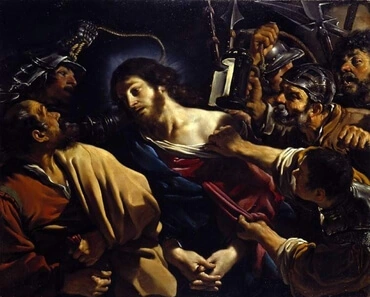Explanation of John 1:10
By Brian David

The beginning of John 1 illustrated how divine truth – which is the ultimate expression of the Lord’s love – is the actual creative force of the universe and of reality itself. That idea is reinforced here: "him" refers to Jesus, who was the physical embodiment of divine truth, which indeed made the world.
This verse offers another level, though. "World" represents the church, which is defined in the Writings as "where the Lord is known and where the Word is." By that definition a "church" can be as small as one person, or as large as billions of people worshiping through a wide variety of denominations. And the Writings tell us that the Lord has made sure that such a church always existed, from prehistoric times when the Lord offered "the Word" – His truth – to people directly up through today, when we have the Word in the form of the Bible.
But the world did not know him. At the time the Lord came among us as Jesus, people had turned away from the deeper meanings of the Word (which they then had in the form of the Old Testament), and had little to no concern for knowing the Lord. His church – the church among the Children of Israel – had turned away.
This might seem like a merely historic idea, something that happened then but has little to do with us now. But each one of us is a "church," and each one of us can know the Lord and the Word, or turn away. We all go through states when we are like the church at the time the Lord was born, and He can rebuild us now even as He rebuilt the church then. For that to happen, though, we need to turn to the Word – the Bible – and know the Lord.
(Notae: Apocalypse Explained 1093; Canons of the New Church 9; The Apocalypse Explained 294 [16])
Arcana Coelestia #8797
8797. 'Everyone touching the mountain will surely die' means that anyone belonging to the spiritual Church who forces his way through to celestial [communities] will be destroyed. This is clear from the meaning of 'the mountain' as the good of love, dealt with just above in 8795, at this point the Divine Good of Divine Love in the inmost heaven, since the people below the mountain represent the Lord's spiritual kingdom, which is the middle heaven; from the meaning of 'touching' as penetrating that far, at this point forcing one's way through, dealt with below; and from the meaning of 'surely dying' as being destroyed.
[2] The situation here is that those belonging to the Lord's spiritual kingdom cannot flow into the celestial kingdom since this is higher or more internal and the spiritual kingdom is lower or more external; for what is more external or lower cannot flow into what is higher or more internal, 5259, 5779. However it sometimes happens that those in a lower heaven seek to go up into a higher heaven; they seek to do so because of a wrong desire that has its origin in pride, dominion, or envy. Those who have that desire and venture up are also let in now and again; but then they suffer badly. They are seized by anxiety, at length by pain, and also by blindness; their intelligence is destroyed, and their happiness. On account of all this they cast themselves down from there as if they are about to die, and do not revive until they have been cast down out of heaven.
[3] Such is the fate of those belonging to a lower heaven who force their way through to a higher heaven from a desire born of pride, dominion, or envy. The reason why they suffer badly is that the good of love in the higher heaven is comparatively like a devouring fire, and the truth of faith there is like fiery light blinding the sight of those coming up from below. These are the things that are meant in the internal sense by the Israelite people's being forbidden to touch Mount Sinai where Jehovah was. A similar fate would await those belonging to the celestial kingdom if they perhaps tried to go up above to the Divine. It also awaits those who are below heaven if they desire to go up into heaven; they too suffer badly, see 4225, 4226, 4299, 5057, 5058.






